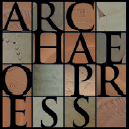
Publishing Scholarly Archaeology since 1997

Download Sample PDF
H 290 x W 205 mm
194 pages
78 figures, 3 tables (31 plates in colour)
Published Mar 2019
ISBN
Paperback: 9781789690002
Digital: 9781789690019
Keywords
Sardinia; Identity; Roman Empire; Burial practice; Roman Republic; Archaeology; Postcolonialism
Archaeopress Roman Archaeology 55
Funerary Archaeology and Changing Identities: Community Practices in Roman-Period Sardinia
By Mauro Puddu
Paperback
£40.00
Includes PDF
PDF eBook
(personal use)
£16.00
PDF eBook
(institutional use)
£40.00
This book analyses in detail the funerary evidence from burial sites in southern and central Sardinia, proposing an alternative interpretation of the island and of other Roman Provinces in which local communities played an active and creative role in shaping back the Roman-world within the specific material and historical conditions they lived in.
Contents
PREFACE ;
1. ROMAN-PERIOD SARDINIA: A SEMIOTIC THEORY OF IDENTITY ;
2. BURIALS OF SARDINIA: METHODOLOGY OF DATA COLLECTION ;
3.FUNERARY PRACTICE AND THE URBAN COMMUNITIES OF SULCI ;
4.FUNERARY PRACTICE AND RURAL COMMUNITIES OF MASULLAS ;
5. FUNERARY PRACTICES AND URBAN COMMUNITIES IN KARALES ;
6. CONNECTING THE DOTS: SULCI, MASULLAS, KARALES AND THE MEDITTERRANEAN ;
7. SARDINIA’S COMMUNITIES AND THE MEDITERRANEAN AT LARGE ;
APPENDIX 1 ;
APPENDIX 2: COARSE WARE TYPOLOGY OF CERAMICS FROM MASULLAS
About the Author
Mauro Puddu has spent most of his years as an archaeologist researching Sardinia. After studying at the Università degli Studi di Cagliari for his BA in Cultural Heritage and his first Masters in Classical Archaeology, he decided to broaden his research horizons taking a second Masters at University College, London, in theoretical Archaeology. During his PhD research at the University of Cambridge, Faculty of Classics he applied the knowledge acquired in Italy and the United Kingdom to study the funerary practices of Roman-period Sardinia. In a decade of research, the author has taken part in numerous successful archaeological projects, among which were the excavation of ‘La Sella del Diavolo’, Cagliari, run by the Soprintendenza archeologica di Cagliari; the Al-Mafjar Project in Jericho, Palestine, run by Birzeit University and the Khalili Research Centre, University of Oxford; and the Interamna Lirenas Project, run by the University of Cambridge. In recent years, during research on future projects and publications, Mauro has been working around London and Cambridge on a vast number of projects, which included the excavation of the Westminster School next to Westminster Abbey.Reviews
'By incorporating a robust theoretical framework, the author joins others […] in rejecting the now-outdated conception of “Romanized” cities along Sardinia's coast versus a “native” rural hinterland… The author is at his strongest when dealing with theory.' —Allison L.C. Emmerson, American Journal of Archaeology, September 2020

 Add to wishlist
Add to wishlist
